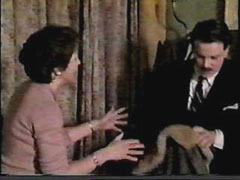
With Colin Firth as Freddie Page
That was the theme of The Deep Blue Sea." --Sir Terence Rattigan
"A kind of homme fatal?" --A character in The Deep Blue Sea, describing Freddie Page
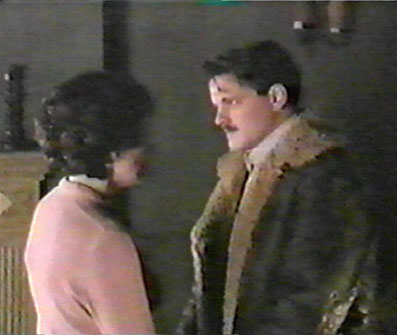
![]()
|
Cast (in alphabetical order)
Directed by Karel Reisz
Presented in the BBC TV Performance series on November 12, 1994 |
![]()
|
| This is a three-act play by Terence Rattigan; it
originally opened in London on March 6, 1952. The play tells the story
of the passion of an older woman for a younger lover, for whom she has
left her husband-a love that is ill-fated. Following a standard theatrical
convention, it takes place in the period of one day in one setting-a flat
in London.
Act 1 The play opens with a failed suicide attempt by Hester Collyer. She has unsuccessfully tried to gas herself. The landlady, the couple upstairs, another lodger who is a doctor-turned-bookie end up in her flat in the aftermath, as does her estranged husband. He is a famous judge, who had been called in when it looked as though Hess might die. Once Hester is pronounced fit by the bookie-doctor and is again alone, her lover, Freddie Page (Colin's role), an ex-RAF pilot, returns home from a weekend away. It becomes clear that Hess made the suicide attempt because Freddie did not show up the night before for her birthday. The act ends with Freddie accidentally finding and reading the suicide note that Hess had left.
Act 2 The second act begins with Freddie talking to his friend, Jackie, explaining
his horror at being able to inspire such passion. It becomes evident that
Freddie is-and has been-drinking too much and no Act 3 In the third act, Hess is desperate to get in touch with Freddie via
phone at whatever night club he is at and beg him to return. In the course
of the act, Hess's husband comes to the flat and asks her to come *************************
"There is, in fact, comparatively little action. The situation is complete when the curtain rises. It only needs explanation, and that explanation is conducted with the subtlety of a good whodunit. There are two problems to be solved. The first is, why did Hester try to kill herself? The second is, given the same circumstances, would she do it again?" -B. A. Young, The Rattigan Version |
![]()
|
|
The film was part of the BBC Performance series, and it was based on a stage production of The Deep Blue Sea at the Almeida Theatre. It has the quality of a filmed stage play. Some of the actors, including Penelope Wilton as Hess, reprised their roles from the stage. However, Colin Firth was not in the stage cast; the role of Freddie had been played by Linus Roache ("Wings of the Dove"). The Role Colin again plays somewhat of a self-aware cad, judging from the lines in the play themselves. He is aware of his own inability to give Hess the kind of unconditional love that she craves and that he inspires in her. It is almost as if he is trying his best, but is lacking the depth and character to do so. As an ex-RAF pilot, Colin cuts a dashing figure in his leather bomber jacket, and this is one of the few roles in which he sports a mustache (as do Charles Holroyd and Simon Westward). Colin's role as originally performed on stage has been described as "shiftily charismatic, a jauntily sexy figure, a born lady- killer." Colin does carry over some aspects of the character-but also conveys a troubled side to Freddie. In comparison with some of Colin's other roles, this role seems somewhat a mixture of the self-absorbed qualities of Simon Westward in "Circle of Friends" and the jaunty "hooray Harry" qualities of Geoffrey Clifton in "The English Patient." Freddie is a kind of man-boy. The Character's Scenes Colin appears toward the end of the first act and is on stage/screen much of the second act. His third act appearance is his briefest. Despite the somewhat superficial, self-centered character he plays and
that the fact his main function is In the second act, he gets to show anger-through much of his conversation
with his friend Jackie (as he bemoans the situation he is in, inspiring
suicidal love) and even toward Hess, who is "mothering" him. Colin is petulant
and on edge through much of And this act has perhaps Colin's cruelest lines in any of his films, where he asks for a shilling and tells Hess to use it for the gas the next time he's late for dinner. The second acts ends with Freddie telling Hess of his intention of going to South America without her; in this scene, Colin has to appear as if reciting a speech-but gets angry as he shouts "We're death to each other" as Hess totally breaks down emotionally. In the last act, Colin's role is limited to the scene where he comes to pick up his things and would obviously be persuaded to stay if Hess said the word. This is some of Colin's best acting for me in this play-he manages to suggest that Freddie wants to come back, doing so with his eyes mostly, but also body language-it's not that evident from the lines themselves what Freddie wants and is feeling. Colin's expressions also show his sadness at ending the relationship with Hess-revealing some genuine emotion for a cad. Looks: Check out the last scene, where Colin-with his hair a bit disheveled and one lock falling over his forehead-in that bomber jacket. I think that this is the best-looking moment of all of Colin's cads. Other: Check out the "most domestic" scenes that this play has-drying dishes and plopping off his shoes. Mannerisms: The use of the hand to the head is one mannerism that occurs several times (there's one movement that's just like Stephen Whalby talking to Manciple about Lyn's affair). And in the last scene, when we are supposed to figure out that Freddie is very emotional and might go back to Hess, he clears his throat (a standard CFism-think of the Pemberley meeting scene, for example). See Favorite Scenes for more of an explanation of key scenes. |
![]()
|
| * Colin has acted onstage at the Almeida Theatre
in the role of Chatsky. That theater's production of The Deep Blue Sea
was the basis for this filmed version.
* The play ran at the Almeida from January 6 to March 3, 1993. It then moved to the Apollo Theatre in the West End. The play's director was Karel Reisz. Cast was Penelope Wilton (Hester), Linus Roache (Freddie), Nicholas Jones (William Collyer), Sandra Voe (Mrs. Elton), Wojtek Pszoniak (Mr. Miller), and Edward Tudor-Pole (Jackie Jackson). Penelope Wilton won the Critics' Circle Award for Best Actress for this role. (Incidentally, she is married in real-life to Ian Holm, who plays her husband in the TV version.) * The original cast in 1952 included Peggy Ashcroft as Hess and Kenneth
More as Freddie. * The play was made into a film with Vivien Leigh as Hess in 1955 and Kenneth More reprising his role as Freddie. * Films of Terence Rattigan's plays include The Winslow Boy (with Robert Donat and Margaret Leighton, 1948), The Browning Version (with Michael Redgrave, 1951; more recent version with Albert Finney and Greta Sacchi), Separate Tables (Burt Lancaster, David Niven, Wendy Hiller, Rita Hayworth, Deborah Kerr). The Prince and the Showgirl (Marilyn Monroe, Laurence Olivier) was based on one of his plays. Other films scripted by Rattigan are The VIPs (with Elizabeth Taylor and Richard Burton) and The Yellow Rolls Royce (with a star-studded international cast). * Rattigan himself had served in the RAF during World War II, although he spent much of the latter part of the war writing plays. * On film, Karel Reisz's directorial credits include The French Lieutenant's Woman, Isadora, and Saturday Night and Sunday Morning. |
![]()
|
When in 1996, BBC TV viewers voted Colin Firth their favorite BBC actor
of all-time, Colin, accepting the award thanked the BBC for giving him
some of his greatest satisfaction in terms of work. In addition to this
play, his work for the BBC has included Tumbledown, Out of the Blue, The
Widowing of Mrs. Holroyd, and of course Pride and Prejudice.
![]()
|
| There is more high art in a Solihull massage parlour
than on television next weekend. Still, one good stage-play does find its
way onto the small screen after a successful West End run. It is Terence
Rattigan's The Deep Blue Sea, which was revived with a terrific cast (headed
by Penelope Wilton and Ian Holm) under the direction of Karel Reisz (today,
BBC2, 9:30 in the Performance slot).
Some present-day commentators deplore the social restrictions which meant that Rattigan, drawing on a tragic homosexual love in his life, had to express the story in heterosexual terms through a heroine, the . . . suicidal Hester. But then this very act of covertness gives the play its rich ambiguity and its handle on English emotional repression. The piece is well worth a resuscitation. -- Richard Morrison, November 12, 1994 The Times Vision, The London Times A reminder of Rattigan's mastery of emotions Terence Rattigan's The Deep Blue Sea (BBC2) comes to the small screen in the much-praised production from London's Almeida Theatre. Penelope Wilton plays the middle-aged women whose attempted suicide opens the play and sets its theme. Ian Holm is her estranged husband and Colin Firth the former Battle of Britain pilot with whom she lives. Three finely tuned performances bring out the force and subtlety of Rattigan's exploration of the delusions of love. The unobtrusive director is a name more often associated with the cinema Karel Reisz. ---The Times Vision, Daily Listings, November 12, 1994, The London Times Choice: Performance Penelope Wilton recreates her superb stage performance as the married woman painter driven to attempted suicide by her younger lover (Colin Firth in a moustache) in Karel Reisz's adaptation of Terence Rattigan's 1952 drawing room tragedy. Ian Holm plays Wilton's estranged husband. --The Independent, November 12, 1994 |
![]()
|
| Act 1
Freddie has forgotten Hess's birthday. His explanation shows the superficiality
of Freddie:
Then of course he has to charm, Hess:
Act 2 Key scene with Jackie Explaining his reaction to Hess's suicide, in sometimes funny terms:
Then he begins to justify himself:
Now my favorite defense-his description of himself as the victim of
Hess's suicide:
And now for his description of himself as trying to avoid involvement:
Jackie's line: A kind of homme fatal?
More defense:
With Mr. Miller he asks:
And one of Colin's cruelest line as he leaves Hess and Mr. Miller:
Scene where he tells Hess he is leaving:
|
![]()
|
| The Genesis of the Play
Biographers of Terence Rattigan agree that Rattigan based the play The Deep Blue Sea on the events in his own life-Rattigan's closet and closest lover, Kenneth Morgan, committed suicide after one of their frequent breakups. However, the consensus seems to be that Rattigan never actually wrote the play with the main characters of Hester and Freddie as male lovers, as has been suggested. And one biographer even goes so far as to say that the characters became some of the most fictional of any of Rattigan's characters, although the play was obviously an attempt on Rattigan's part to distill and come to terms with his life experience, including his obsessive and possessive relationship with his lover. The Ending of the Play When the play first was on, some people proposed that the ending would have been more convincing if Hess had committed suicide, or claimed that Hester chose to live for all the wrong reasons (Kenneth Tynan). Another viewpoint on the ending:Hester's Character Here is a quote from Rattigan's notes about Hester as he wrote the screenplay, making his intentions about Hess clearer: Hester's death wish is rooted in her sense of shame and that sense of shame has become an intolerable burden through her need for a man who she believes doesn't need her. In fact, he does and if she could ever find out how strongly he does her respect might return. And with self-respect a will to life.In any case, Hester has many of the qualities of emblematic Rattigan character: she is humiliated (begging Freddie not to leave), a hallmark of many of Rattigan's characters, but she ultimately represses her emotion, another Rattigan characteristic. Weak vs. Strong The issue is, Who is stronger-Freddie or Hester? One critic judges Hester as stronger as she makes the break at the end. (And doesn't she seem the stronger in this production?) However, certainly Freddie in his lines suggests that he is capable of making decisions about their relationship and acting on them. Here is the view of another critic:Rattigan's Reputation
Several of Rattigan's plays concerned well-known British court cases-The Winslow Boy is about the defense cadet expelled from school for supposedly stealing a postal order, with the focus on efforts expended by the father in defense of his son and the effects of the court case on the family; Cause Celebre was based on a famous court case of a woman and her younger lover accused of killing her husband. He also wrote a couple of "biographical plays"-Adventure Story about Alexander the Great (Paul Scofield played the role of Alexander in the original production) and Ross based on T. E. Lawrence. |
Here is a review from a current production of The Deep
Blue Sea on Broadway that reflects the opinion in which Rattigan is currently
held.
New York Post
Terence Rattigan made plays the way Thomas Chippendale made furniture - very carefully. One of his best, "The Deep Blue Sea," turned up at the Roundabout Theater last night, and it proves a perfect example of how extraordinarily good a play can be without, for a moment, showing any particular sign of being great. When the play opens, the heroine is found huddled in a shapeless heap in front of an unlit gas burner. Of course, at the time we don't know that this bundle of clothes is the heroine. We don't even know whether she - it looks like a she - is alive or dead. But the play, and we in the fascinated audience, are up and running. Rattigan's exquisitely crafted piece is set in a bleak 1951 London. Six years have passed since the end of World War II, but in England it is still a chill age of austerity and ration books, and a cold climate for love. The would-be suicide is Hester Collyer (Blythe Danner), a middle-class, early-middle-age beauty who has left her safe and stolid husband, a High Court Judge, Sir William Collyer (Edward Herrmann), to live with Freddie Page (David Conrad), a much-decorated wartime flyer and former test pilot. Hester has a consuming sexual passion for Freddie, while Freddie, charming, jobless and by now chiefly absorbed by golf and booze, loves her in his fashion, staying in the uneven partnership from a mix of convenience, inertia and boyish affection. The dramatic situation was - according to Rattigan's biographers and the theatrical gossip of the time - largely autobiographical, although transposed from Rattigan's own closeted homosexual lifestyle. The playwright, however, offers himself and his play many options. Hester, lost in this hopeless relationship, feeling herself caught between the devil of her sexual need and the deep blue sea of suicide, is given the opportunity to return to her husband's safety net. Or suicide. Or perhaps accompany Freddie to Brazil, where he has the chance of working, once more, as a test pilot. The solution Rattigan opts for - suggesting that survival is possible even without hope - seems something of a cop-out. It would not have done for Ibsen - but Rattigan is not Ibsen and "The Deep Blue Sea" is only a kind of boulevard tragedy, leaving us finally to admire its mechanics rather than thrill to its mechanism. Danner, confusedly passionate, lacks the devastating subcutaneous sexuality of Peggy Ashcroft in the 1952 premiere, but her tortured gentility compares well with Vivien Leigh in the movie version, and Herrmann, as the stiffly forgiving older man, loving awkwardly but dutifully, proves touchingly gauche. Yet the play still works surprisingly well. Rattigan certainly knew how to make them. Just like Chippendale. |
|
(Murph's scrapbook) Terence Rattigan is well on the way toward becoming one of England's
most prolific, and |
![]()
|
| This discussion prompts me to rate Colin's character in
terms of weak and strong characters.
This is, of course, a totally personal interpretation: it has to do with will and will used in the "right way." And if I did it tomorrow, I am sure that the rankings would change-as the criteria are but vaguely defined. Doing this, however, I was surprised at how many are strong. I tend to think of Colin's characters in terms of their vulnerability. Note: A Score of 1 to 10. Higher marks indicate more determination. 8.7: Charles Gould: Seems one of the most
determined and focused of all Charles's role-but of course, the focus is
too narrow and obsessive.
Where does Freddie fit in, in your opinion? |
![]()
|
| ***** | Superb/breathtaking/heartstopping/etc |
| **** | Excellent |
| *** | Very pleasing |
| ** | Still lovely, but . . . |
| * | Bad hair day |
Janet's personal ratings:
(out of five stars)
| ***** | Colin's looks:****(seen a bad copy of this; but doesn't he look great in the bomber jacket picture) |
| ***** | Colin's acting ability: **** (Freddie is a tough character to portray) |
| **** | The film in general: **** (good production of the play) |
| **** | Ranking in the films of Colin Firth:*** (not really a film-more a stage play) |
| ***** | Watchability and rewind factor:*** (per above) |
![]()
|
|
|
| This page written by Janet, edited by Ann, designed
by Murph
Snappy photos taken from video by Sharon This page is part of a Firthland project on the films of Colin Firth.
|
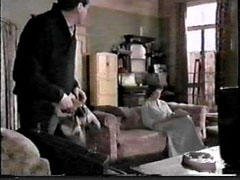
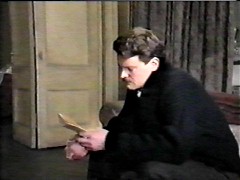
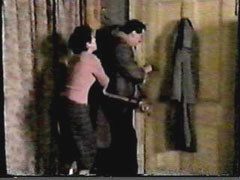 longer has a job. He has wanted to marry Hess, but she won't hear of it.
In the course of the act, in a scene between Hess and her husband, the
story of how Freddie and Hester were first attracted to each other is explained,
as well as how the marriage between Hess and her husband had gone stale.
At the end of the second act, Freddie announces, in a prepared speech,
that he has gotten a job as a test pilot in South America and plans to
leave without Hess and that the pair is "death to each other." Hess begs
him to stay, but the curtain shows him walking out.
longer has a job. He has wanted to marry Hess, but she won't hear of it.
In the course of the act, in a scene between Hess and her husband, the
story of how Freddie and Hester were first attracted to each other is explained,
as well as how the marriage between Hess and her husband had gone stale.
At the end of the second act, Freddie announces, in a prepared speech,
that he has gotten a job as a test pilot in South America and plans to
leave without Hess and that the pair is "death to each other." Hess begs
him to stay, but the curtain shows him walking out.
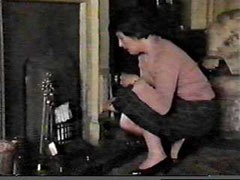 back to him, but she refuses. The audience sees that, in her desperation,
she is again contemplating suicide, but the doctor-bookie interrupts her
before she has a chance to carry forward her intention and forces her to
analyze her action. When Freddie returns to pick up some of his things,
it is clear that he would stay if Hess gave him the word, but at this point,
she doesn't ask him. When he leaves, she sits in front of the gas fire
and turns on the gas-obviously deciding not to commit suicide.
back to him, but she refuses. The audience sees that, in her desperation,
she is again contemplating suicide, but the doctor-bookie interrupts her
before she has a chance to carry forward her intention and forces her to
analyze her action. When Freddie returns to pick up some of his things,
it is clear that he would stay if Hess gave him the word, but at this point,
she doesn't ask him. When he leaves, she sits in front of the gas fire
and turns on the gas-obviously deciding not to commit suicide.
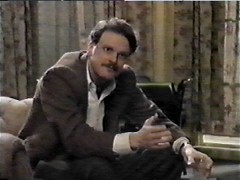 to
be the object of Hess's obsessive love, Colin does get to show somewhat
of a range of emotions. In the first act, he gets to show one of his best
"oh I can't believe I forgot," banging hands to his face and lowering them
almost in prayer, when he remembers that he forgot Hess's birthday. This
is shortly followed by a scene where he has to charm Hess ("Give us a shot
of those gorgeous brown orbs").
to
be the object of Hess's obsessive love, Colin does get to show somewhat
of a range of emotions. In the first act, he gets to show one of his best
"oh I can't believe I forgot," banging hands to his face and lowering them
almost in prayer, when he remembers that he forgot Hess's birthday. This
is shortly followed by a scene where he has to charm Hess ("Give us a shot
of those gorgeous brown orbs").
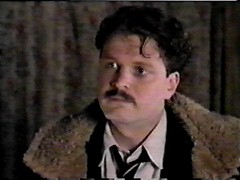 the act--even a bit drunk in parts. As mentioned, Colin is "on stage" for
much of the second act, which begins with the long scene where he is explaining
his relationship with Hess to his friend, Jackie Jackson-his desire to
marry her, their rows. He gives his credo as a superficial lover, basically
justifying himself as giving all he can ("Hell, it's not as if I'm not
in love with her too, of course, I am. Have been and always will. But-well-moderation
in all things has always been my motto."). And he gets to be angry with
Jackie when Jackie doesn't seem to understand him-or just because Jackie
has a normal life with his wife.
the act--even a bit drunk in parts. As mentioned, Colin is "on stage" for
much of the second act, which begins with the long scene where he is explaining
his relationship with Hess to his friend, Jackie Jackson-his desire to
marry her, their rows. He gives his credo as a superficial lover, basically
justifying himself as giving all he can ("Hell, it's not as if I'm not
in love with her too, of course, I am. Have been and always will. But-well-moderation
in all things has always been my motto."). And he gets to be angry with
Jackie when Jackie doesn't seem to understand him-or just because Jackie
has a normal life with his wife.
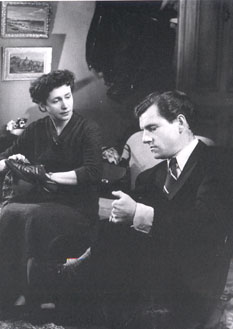 This
was the role that launched More's career.
(See picture at right.)
This
was the role that launched More's career.
(See picture at right.)
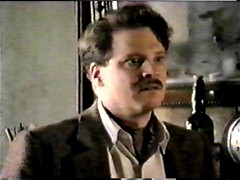
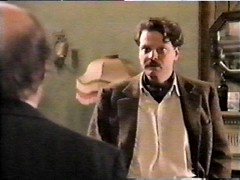
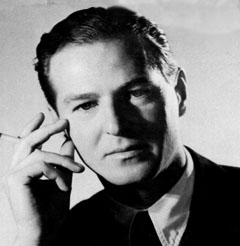
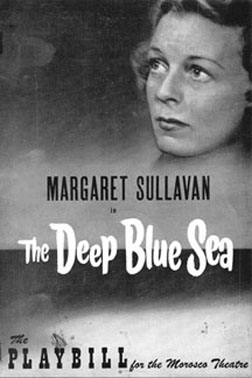 successful,
playwrights. At his current (1953) ripe-old-age of forty one he has achieved
a distinguished position in both the London and New York theatres. Educated
at Harrow and Trinity College, Oxford, his first play, aptly titled "First
Episode," opened in London when he was 22. It was followed by the enormous
London success, "French Without Tears," which ran over a thousand performances.
Thereafter his "Flare Path" ran 670 performances in London, and then "While
The Sun Shines" opened in 1943 and ran for 1154 performances. In 1944 London
saw his "Love In Idleness," which became "O Mistress Mine" when Alfred
Lunt and Lynn Fontanne appeared in it here. And, again, his next play,
"The Winslow Boy," was a resounding success in both London and New York.
Indeed, so was his most recent, "The Browning Version," starring Maurice
Evans. During World War II Mr. Rattigan's typewriter-trained-fingers held
him in good stead as an R.A.F. tail-gunner. "The Deep Blue Sea" is a current
favorite in London, also directed there by Frith Banbury.
successful,
playwrights. At his current (1953) ripe-old-age of forty one he has achieved
a distinguished position in both the London and New York theatres. Educated
at Harrow and Trinity College, Oxford, his first play, aptly titled "First
Episode," opened in London when he was 22. It was followed by the enormous
London success, "French Without Tears," which ran over a thousand performances.
Thereafter his "Flare Path" ran 670 performances in London, and then "While
The Sun Shines" opened in 1943 and ran for 1154 performances. In 1944 London
saw his "Love In Idleness," which became "O Mistress Mine" when Alfred
Lunt and Lynn Fontanne appeared in it here. And, again, his next play,
"The Winslow Boy," was a resounding success in both London and New York.
Indeed, so was his most recent, "The Browning Version," starring Maurice
Evans. During World War II Mr. Rattigan's typewriter-trained-fingers held
him in good stead as an R.A.F. tail-gunner. "The Deep Blue Sea" is a current
favorite in London, also directed there by Frith Banbury.